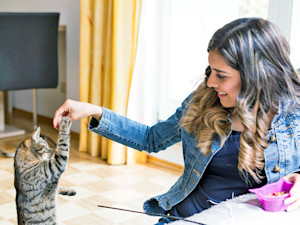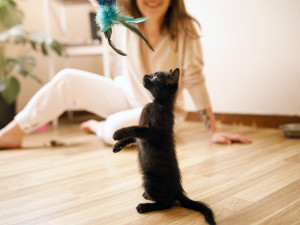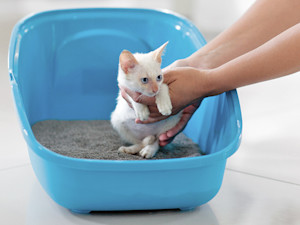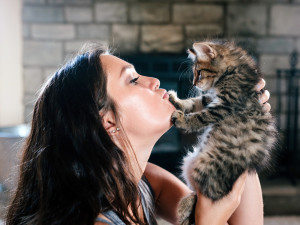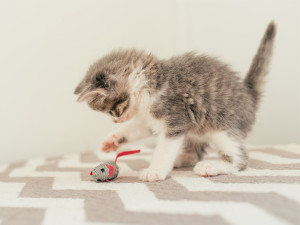6 Common Reasons Why Kittens Suck on Blankets
This totally cute kitty behavior is OK, right?

Share Article
In This Article:
Is It Normal for Kittens to Suck on Blankets? Reasons Your Kitten Is Sucking on Blankets Do You Need to Stop Your Kitten From Sucking on Blankets? Cat Breeds More Likely to Suck on Blankets What to Do if Your Kitten Sucks on Blankets When to Consult a Vet for Blanket Sucking
You’re relaxing on the couch with your kitten, who’s purring like a tiny motorboat. Then, out of nowhere, they start sucking on the corner of your favorite blanket like it’s the last straw of a milkshake. Cute? Definitely. Weird? A little bit. Should you worry? That depends.
Blanket-sucking is one of those behaviors that walks a fine line between cute and confusing. Is it a quirky kitten phase, a cry for help, or a way for a cat to unwind? This oddball habit could be many things or nothing, and understanding the “why” could help you better care for your feline companion.
Main takeaways
Blanket-sucking is a normal behavior for kittens, often rooted in nursing instincts or as a comforting habit.
Common reasons for blanket-sucking include teething, stress, anxiety, or even nutritional deficiencies.
While usually harmless, excessive blanket-sucking or fabric ingestion could indicate health problems like pica or digestive issues.
Certain breeds, such as Siamese and Burmese cats, are more likely to develop this behavior due to their sensitive, affectionate natures.
Simple steps such as offering alternatives, reducing stress, and ensuring proper nutrition can help manage or redirect the habit if needed.
Is it normal for kittens to suck on blankets?
Yes, it’s quite normal for kittens to suck on blankets. This can be self-soothing behavior, like when humans twirl their hair around their fingers or hug a stuffed animal. Many kittens will grow out of blanket-sucking as they mature, but some cats continue the behavior into adulthood.

However, if your kitten’s obsession with blankets feels a little too intense — like nonstop sucking, fabric chewing, or signs of stress — it may be time to consult a veterinarian or cat behaviorist. Pay attention to your cat’s overall behavior, body language, and health.
Reasons why your kitten is sucking on blankets
1. Nursing instincts
Kittens are born with a built-in nursing reflex to latch onto their mom for milk and comfort. According to Jennifer Van de Kieftopens in new tab, a renowned cat behaviorist, if your kitten was weaned too early, they may look for a soft, warm replacement — like a blanket. Sucking on fabric mimics the soothing rhythm of nursing, giving your kitten a nostalgic taste of their earliest memories.
2. Comfort
We all have our comfort items and rituals. For kittens, a cozy blanket is the feline equivalent of a teddy bear or weighted blanket for humans. It’s their safe space when the world feels too big and chaotic. Blanket-sucking can be your kitten’s go-to, self-soothing strategy, helping them cope with new environments, changes, or even loud vacuum cleaners.
3. Teething
Teething kittens are like teething human babies: Everything becomes a chew toy. Between three to six months of age, kittens’ gums are sore and inflamed as their adult teeth push through. Blanket-sucking may help massage and soothe their gums. Bonus points if the blanket smells like you, their favorite human.
4. Stress or anxiety
Cats are emotional sponges. Even minor changes can send ripples through their world. Moving furniture, bringing home a new pet, or the sound of a doorbell may overwhelm kittens. Sucking on a blanket gives them a sense of control in a chaotic moment. Van de Kieft notes that repetitive behaviors like this often mirror the calming effect of nursing to help kittens de-stress.
5. Something is missing in their diet
Kittens are tiny, adorable eating machines. If they’re not getting the right balance of nutrients, they may start “hunting” food from the wrong places — like your favorite throw blanket. While rare, a nutritional deficiency can sometimes trigger blanket-sucking as their body’s way of saying they are missing something.
6. Health problems
Sucking on a blanket is usually harmless, but excessive blanket-sucking behavior could indicate health problems. For instance, conditions like pica (a compulsive desire to eat non-food items) or digestive discomfort may manifest as fabric fixation. If your kitten seems obsessed with — or starts gnawing off and swallowing pieces of — the blanket, there’s an issue. Contact a veterinarian immediately.
Do you need to stop your kitten from sucking on blankets?
In most cases, it’s harmless for kittens to suck on a blanket. However, if the behavior bothers you or seems obsessive and excessive, you can do the following.
Offer a chew-safe toy or an interactive puzzle to keep your kitten’s paws, mind, and mouth busy.
Look for potential stress triggers in your kitten’s environment. Are they bored, anxious, or adjusting to something new?
Choose durable fabrics that don’t fray and watch for wear and tear from little claws and teeth.
Cat breeds who are more likely to suck on blankets
Not all kittens will suck on blankets. Some breeds are more prone to this behavior than others. Siamese and Burmese cats, for instance, often develop fabric fascination. Their deep attachment to humans and sensitive natures make them more likely to engage in comforting quirks.
What to do if your kitten sucks on blankets
Offer alternatives: Swap out the blanket for a soft toy, a chew stick, or a kitten-safe teething ring. Sometimes, they need something else to latch onto.
Create a stress-free environment: Cats are sensitive to changes in their surroundings. Keep their spaces predictable and their routines stable. Give them plenty of cozy hideaways where they can retreat when life gets loud and chaotic.
Ensure proper nutrition: Double-check that your kitten is getting all the necessary vitamins and nutrients they need. A quick chat with your vet can rule out deficiencies and keep their nutrition on track.
Schedule playtime: A busy kitten is a happy one. Interactive play burns energy, keeps their mind sharp, and reduces anxiety-driven behaviors like blanket-sucking.
When to consult a vet for blanket sucking
Consult a veterinarian if your cat’s blanket-sucking becomes excessive, involves chewing or swallowing fabric, or is accompanied by unusual behavior, like growling or fur-bristling. A veterinarian can rule out medical conditions like pica or gastrointestinal issues and help you address the habit.
Take note of when and how often your kitten sucks on blankets. Sharing these details with your vet can help pinpoint whether the behavior is emotional or associated with health conditions.
Bottom line
When kittens suck on blankets, it’s often a mix of instinct, comfort-seeking, and environmental factors.
The behavior is often harmless and endearing but occasionally indicates deeper emotional or physical needs.
By understanding the reasons behind blanket-sucking, you can ensure your cat feels secure, healthy, and loved as they grow.
FAQs
Is blanket-sucking harmful to my cat?
No, sucking on blankets isn’t usually harmful to kittens. However, it can be dangerous if they chew or ingest pieces of fabric.
Can blanket sucking lead to other destructive behaviors?
Blanket-sucking rarely leads to more destructive behaviors. However, cats may shred and swallow fabric if they feel bored, stressed, or uncomfortable.
What should I do if my cat eats part of a blanket?
Contact your veterinarian immediately. Pieces of fabric can cause intestinal blockages and digestive problems.
Why is my three-month-old kitten still trying to nurse?
This is normal, especially if kittens were weaned too early. Blanket-sucking mimics the comfort of nursing.
References
“Why Do Kittens Suck on Blankets – [Vet Explains Pets].” Vetexplainspets.com, 2024, vetexplainspets.com/why-do-kittens-suck-on-blanketsopens in new tab.
“Why Do Cats Suck on Blankets – [Vet Explains Pets].” Vetexplainspets.com, 2024, vetexplainspets.com/why-do-cats-suck-on-blanketsopens in new tab. Accessed 31 Dec. 2024.

Valerie Mellema
Valerie Mellema has a Bachelor of Science in Agribusiness and Equine Industry from West Texas A&M University. She has been a professional writer for the past 20 years, covering a wide variety of pet health and care topics before founding a nonprofit focused on mental health in children and thoroughbred aftercare. She has four Border Collies and eight retired racehorses.
Related articles
![Person holding small kitten inside litter box.]()
How to Litter-Train a Kitten: Tips and Advice
It’s definitely a process.
![Woman holding brown kitten to her face.]()
8 Myths About Your Kitten—Busted By a Behaviorist
Forget everything you think you know about baby cats.
![Woman using a laptop in bed, looking at her cat]()
What to Expect in the First 48 Hours With Your New Cat
Here’s how to help your rescue kitty feel at home.
![A kitten playing with a mouse cat toy.]()
How to Keep Your Kitten From Making You the Toy at Playtime
Your cat deserves to play. You deserve to walk away unscathed.
![Woman holding small kitten in her hands.]()
Kitten Weight Chart: Track Your Kitten’s Growth
See how they should be progressing.

